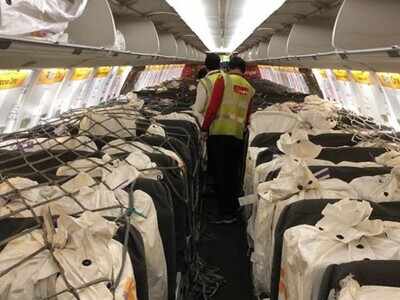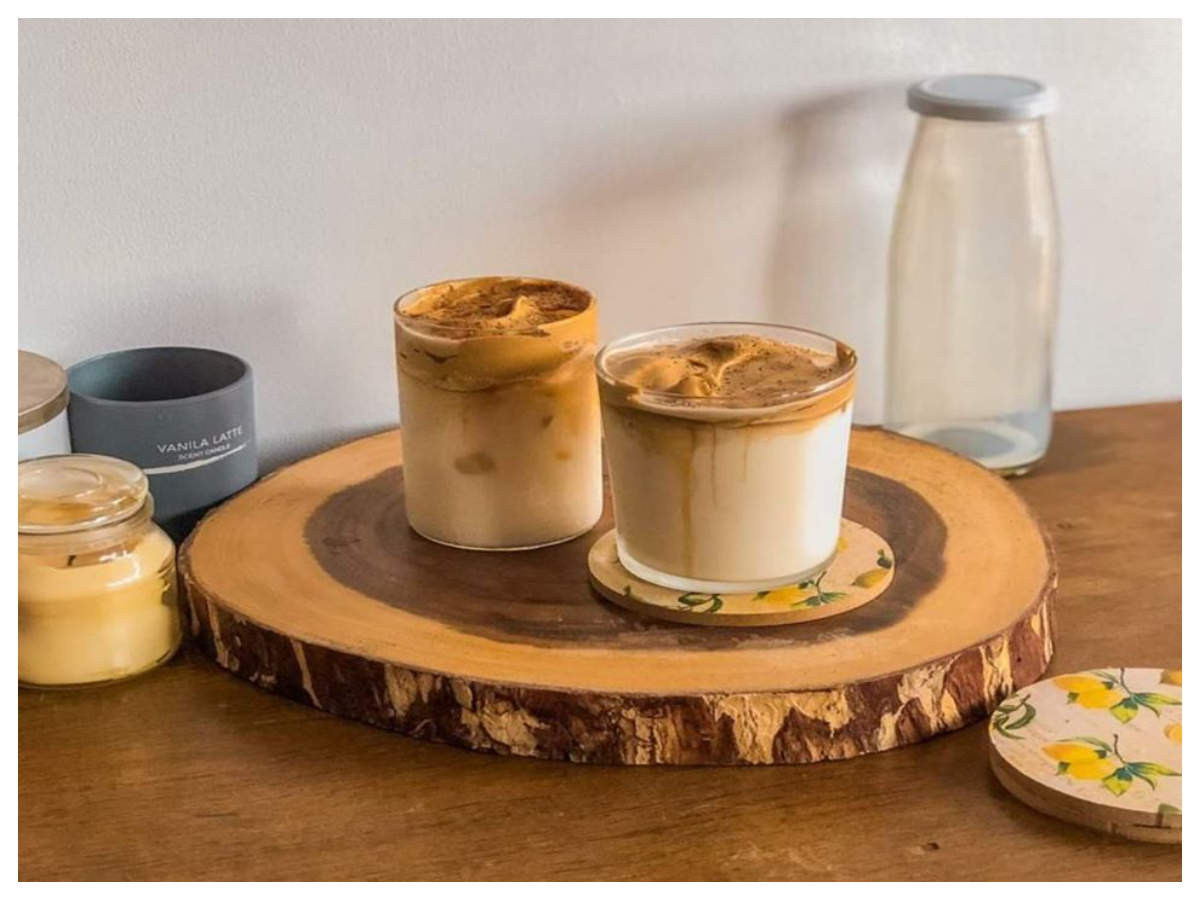
NEW DELHI: Days after India allowed passenger aircraft to be utilised for cargo-only flights, SpiceJet operated the first “cargo-on-seat” service by carrying 11 tonnes of vital supplies in passenger cabin and belly space from Delhi to Chennai on Tuesday.
The budget carrier said its Boeing 737, in passenger configuration, will operate Delhi-Chennai-Surat-Chennai-Mumbai-Delhi, with cargo. While SpiceJet has freighter aircraft, the DGCA nod to use passenger planes for ferrying cargo has meant other airlines can also do so.
Coronavirus outbreak: Live updates
Air India has been operating special cargo and evacuation/repatriation flights to Europe, Israel, Japan and China from January 31. IndiGo on Tuesday said it “has been authorised to operate over 30 relief flights … carrying medical equipment and other requisite resources across the country. The airline has been allowed by the government to carry cargo in their planes, to fly food, medicine and medical equipment in the country’s battle against the pandemic. These flights are being operated by the company at its own cost.”
SpiceJet chairman and managing director Ajay Singh said: “Since the lockdown began, we have carried more than 1,400 tonnes of cargo operating around 200 domestic and international cargo flights. (On Tuesday), for the first time in the country, we used a passenger aircraft to transport cargo where in addition to the belly space the passenger cabin was used to safely carry essential supplies … We have also put our five freighters to maximum use to transport cold chain medical supplies, medicines, medical devices for various state governments, medical and pharma companies.”
More on Covid-19
Coronavirus pandemic: Complete Coverage
21-day lockdown: What will stay open and what won't
How to quarantine yourself at home
Trust the newspaper for your daily verified news
IndiGo CEO Ronojoy Dutta said: “We are humbled and gratified that despite the lockdown, we have so far been authorised to operate at our own cost over 30 emergency relief flights carrying medical equipment and supplies from one part of the country to another. We know how critical it is for health workers in every corner of the country to get immediate access to medical supplies, and we are grateful to be allowed to play a role, however modest, in this supply chain."
"Our 27,000 employees are standing just a little bit taller, knowing that we are able to mobilize our resources to make a small contribution to the health and well-being of our nation. The employees of IndiGo would also like to salute our colleagues over at Air India, for the heroic work they have been doing in evacuating Indians and other nationals stranded in foreign countries. It makes us all proud to see aviation professionals stepping forward to respond to the critical humanitarian needs of the hour,” he added.
SpiceJet said special seat covers made from flame-proof material were used to cover the seats and the cargo on seat was secured with restraints. To ensure optimum utilisation of space, the overhead bin, were also used.
The budget carrier said its Boeing 737, in passenger configuration, will operate Delhi-Chennai-Surat-Chennai-Mumbai-Delhi, with cargo. While SpiceJet has freighter aircraft, the DGCA nod to use passenger planes for ferrying cargo has meant other airlines can also do so.
Coronavirus outbreak: Live updates
Air India has been operating special cargo and evacuation/repatriation flights to Europe, Israel, Japan and China from January 31. IndiGo on Tuesday said it “has been authorised to operate over 30 relief flights … carrying medical equipment and other requisite resources across the country. The airline has been allowed by the government to carry cargo in their planes, to fly food, medicine and medical equipment in the country’s battle against the pandemic. These flights are being operated by the company at its own cost.”
SpiceJet chairman and managing director Ajay Singh said: “Since the lockdown began, we have carried more than 1,400 tonnes of cargo operating around 200 domestic and international cargo flights. (On Tuesday), for the first time in the country, we used a passenger aircraft to transport cargo where in addition to the belly space the passenger cabin was used to safely carry essential supplies … We have also put our five freighters to maximum use to transport cold chain medical supplies, medicines, medical devices for various state governments, medical and pharma companies.”
More on Covid-19
Coronavirus pandemic: Complete Coverage
21-day lockdown: What will stay open and what won't
How to quarantine yourself at home
Trust the newspaper for your daily verified news
IndiGo CEO Ronojoy Dutta said: “We are humbled and gratified that despite the lockdown, we have so far been authorised to operate at our own cost over 30 emergency relief flights carrying medical equipment and supplies from one part of the country to another. We know how critical it is for health workers in every corner of the country to get immediate access to medical supplies, and we are grateful to be allowed to play a role, however modest, in this supply chain."
"Our 27,000 employees are standing just a little bit taller, knowing that we are able to mobilize our resources to make a small contribution to the health and well-being of our nation. The employees of IndiGo would also like to salute our colleagues over at Air India, for the heroic work they have been doing in evacuating Indians and other nationals stranded in foreign countries. It makes us all proud to see aviation professionals stepping forward to respond to the critical humanitarian needs of the hour,” he added.
SpiceJet said special seat covers made from flame-proof material were used to cover the seats and the cargo on seat was secured with restraints. To ensure optimum utilisation of space, the overhead bin, were also used.
Download
The Times of India News App for Latest Business News
Subscribe
Start Your Daily Mornings with Times of India Newspaper! Order Now
more from times of india business
Quick Links
ELSS Mutual Funds BenefitsIncome Tax Refund statusWhat is AssochamITR Filing Last DateHome Loan EMI TipsHome Loan Repayment TipsPradhan Mantri Awas YojanaTop UP Loan FeaturesIncrease Home Loan EligibilityHome Loan on PFTax Saving Fixed DepositLink Aadhaar with ITRAtal Pension YojanaNita AmbaniIndian EconomyRBIAadhaar CardSBIReliance CommunicationsMukesh AmbaniIndian Bank Ifsc codeIDBI Ifsc codeIndusind ifsc codeYes Bank Ifsc CodeVijay Bank Ifsc codeSyndicate bank Ifsc CodePNB Ifsc codeOBC Ifsc codeKarur vysya bank ifscIOB Ifsc codeICICI Ifsc codeHDFC Bank ifsc codeCanara Bank Ifsc codeBank of baroda ifscBank of America IFSC CodeBOM IFSC CodeAndhra Bank IFSC CodeAxis Bank Ifsc CodeSBI IFSC CodeGST
Get the app








